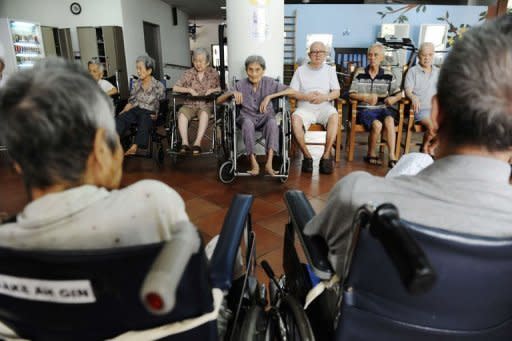‘Inclusive Budget with focus on elderly laudable’

Creating an inclusive society has been a goal of the government for a while now. It is nothing new. "Ours must be an open and inclusive Singapore," the Prime Minister himself said in 2004 when he took office.
For the most part, however, Singaporeans — especially the elderly who feel left behind in a fast-paced Singapore — have not seen such inclusiveness. On the contrary, and as the elections in May last year showed, Singaporeans felt alienated and unhappy about certain government policies which were perceived to pander to non-Singaporeans in our midst.
There is little doubt that Budget 2012 is a direct response to this discontent on the ground. "Our mission is to build an inclusive society and a stronger Singapore," Finance Minister Tharman Shanmugaratnam, who is also Deputy Prime Minister, reiterated in his speech in Parliament on Friday.
The measures announced by Tharman go some way in addressing several key areas of concerns for Singaporeans, as the ageing population mandates a restructuring of our economy. And as far as being inclusive is concerned, it is laudable to see that the government has gotten more serious about addressing the needs of the more vulnerable segments of our society — one of which is the elderly.
A fast-ageing population is a concern for any society. For Singapore, the issue has been on the government's mind for some time now. In 20 years, the city state will have some 800,000 citizens who will be 65-and above. Addressing this will involve the re-invention of policies, and introducing practical solutions over a slew of issues — from housing to employment, from healthcare to community space, from the cost of living to retirement needs.
The measures announced in the Budget seem to have taken a holistic view in addressing these, which is welcomed.
Starting with the belief that the needs of more senior Singaporeans are best catered for through employment, the criteria by which firms can draw on government subsidies when hiring and retaining older workers have been enhanced under the Special Employment Credit (SEC) scheme.
Among other measures which will benefit elder Singaporeans, the CPF contribution rates have been increased, tax relief for those 55 and above have been enhanced, and new housing subsidy schemes introduced, including a silver housing bonus of S$20,000 for those who downgrade to a smaller HDB flat. This is to unlock the value of their flats and to afford these senior citizens some financial security in their later years.
Emphasis on healthcare
Healthcare, which features at the top of many senior citizens' list of concerns, are also addressed in the Budget. "We want to help Singaporeans age with dignity and grace," Tharman said. "Our seniors aspire not just to live long, but to have fulfilling, active golden years."
To achieve these ideals, Tharman announced a significant doubling of the healthcare budget to S$8 billion over the next five years. Singaporeans have been calling on the government to do more in this area and it is good to see the government responding to the calls.
All patients in community hospitals, for example, will now be able to get aid from the government in paying their bills, more will qualify for subsidies for stays in nursing homes, day care and rehabilitation centres, and also for home-care services. There will be top-ups of Medisave, Medishield and Medifund this year, with older citizens receiving more.
The Budget also looks into providing help in the practical problems faced by the elderly in their homes. To this, the government is introducing a new programme to set aside S$2,000 worth of elder-friendly modifications for families in their homes. This will benefit some 130,000 households. Families with seniors will bear not more than S$250 each, as government subsidies will cover the rest of it.
Along with these physical infrastructural help, families with elderly folks who require a maid will now get S$120 from the government to hire one. This is on top of the $95 concession which families with seniors already currently receive.
While all these measures are welcomed, and indeed the government should be commended for these, it is getting the message to those most in need which will be the challenge. It would be no good if such help schemes are not made known to the groups who would benefit from them. Thus, it is incumbent upon Members of Parliament, grassroots volunteers, non-governmental organisations, voluntary welfare organisations, the media and the public in general, to inform our senior citizens who may not be aware of these schemes.
Creating an inclusive society, as Tharman said, is neither the government's role alone nor is it simply about "redistributing resources to help the poor."
As far as the elderly are concerned, it is about how we, individual citizens, see them and how we treat them — in everyday interactions at the work place, at the coffeeshops, the markets, the nursing centres and indeed in our own homes.
"An inclusive society will only blossom," Tharman said, "if we grow this spirit of responsibility and community."
Andrew helms publichouse.sg as Editor-in-Chief. His writings have been reproduced in other publications, including the Australian Housing Journal in 2010. He was nominated by Yahoo! Singapore as one of Singapore's most influential media persons in 2011.

